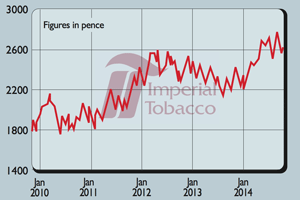US tobacco giants merge
Reynolds and Lorillard, America's second and third-biggest tobacco companies, have agreed to merge.

Get the latest financial news, insights and expert analysis from our award-winning MoneyWeek team, to help you understand what really matters when it comes to your finances.
You are now subscribed
Your newsletter sign-up was successful
Want to add more newsletters?

Twice daily
MoneyWeek
Get the latest financial news, insights and expert analysis from our award-winning MoneyWeek team, to help you understand what really matters when it comes to your finances.

Four times a week
Look After My Bills
Sign up to our free money-saving newsletter, filled with the latest news and expert advice to help you find the best tips and deals for managing your bills. Start saving today!
America's number two and number three tobacco firms are joining forces in a $27bn deal. Reynolds, maker of Camel cigarettes, is taking over Lorillard, whose most famous brand is Newport menthol, America's second-biggest seller.The new entity expects to generate over $11bn in sales and $5bn in operating income.
It's selling off several brands to Britain's Imperial Tobacco for $7.1bn in a bid to placate regulators. These brands include e-cigarette bestseller Blu, Salem and Winston. British American Tobacco, which owns 42% of Reynolds, will spend $4.7bn buying additional shares to maintain that level of ownership.
What the commentators said
Yet, the Food and Drug Administration is worried that menthols seem to make it easier to start smoking and harder to stop, so it could well clamp down on them.
MoneyWeek
Subscribe to MoneyWeek today and get your first six magazine issues absolutely FREE

Sign up to Money Morning
Don't miss the latest investment and personal finances news, market analysis, plus money-saving tips with our free twice-daily newsletter
Don't miss the latest investment and personal finances news, market analysis, plus money-saving tips with our free twice-daily newsletter
Meanwhile, Reynolds is also betting that it can thrive in the small, but fast-growing e-cigarette market without Lorillard's Blu. It is betting on its own product, Vuse, instead.It only began to roll it out last month.
Strategically, the deal is hardly risk-free, agreed Kevin Allison on Breakingviews. Yet the shares of both firms have jumped since the news. Chalk that up to the scope for "aggressive pricing".
Reynolds and Lorillard say this deal will produce a stronger competitor to Altria, the Marlboro manufacturer, which now accounts for half of US cigarette sales. But Altria's shares have risen too.
No wonder, said Nils Pratley in The Guardian. Altria has around half of the US market, while the new group will control around 35%. That's a "powerful and entrenched" duopoly that Imperial, with a US market share of 10%, up from 3%, is now up against. Imperial has also borrowed to pay for brands that, apart from Blu, look like "wheezy also-rans".
Blu, with 45% of the US market, looks promising, said Alex Brummer in the Daily Mail unless regulators turn against e-cigarettes, because they decide they are "just training for the real thing".
Get the latest financial news, insights and expert analysis from our award-winning MoneyWeek team, to help you understand what really matters when it comes to your finances.

-
 Average UK house price reaches £300,000 for first time, Halifax says
Average UK house price reaches £300,000 for first time, Halifax saysWhile the average house price has topped £300k, regional disparities still remain, Halifax finds.
-
 Barings Emerging Europe trust bounces back from Russia woes
Barings Emerging Europe trust bounces back from Russia woesBarings Emerging Europe trust has added the Middle East and Africa to its mandate, delivering a strong recovery, says Max King
-
 Imperial Brands has an 8.3% dividend yield – but what’s the catch?
Imperial Brands has an 8.3% dividend yield – but what’s the catch?Tips With an impressive dividend yield of 8.3%, Imperial Brands looks to be one of the most attractive income stocks in the FTSE 100 . But investors should beware, says Rupert Hargreaves. Imperial’s stock looks cheap – but there are good reasons for that.
-
 Shares in focus: Imperial Tobacco – a safe haven in a rocky market
Shares in focus: Imperial Tobacco – a safe haven in a rocky marketFeatures Imperial Tobacco is defying the sceptics, so is it worth paying up for the shares? Phil Oakley investigates.
-
 Neil Woodford may be a star fund manager – but he’s wrong about tobacco stocks
Neil Woodford may be a star fund manager – but he’s wrong about tobacco stocksFeatures Star fund manager Neil Woodford recently revealed that of his top ten holdings, three are tobacco stocks. But that doesn't mean you should follow his lead. Ed Bowsher explains why.